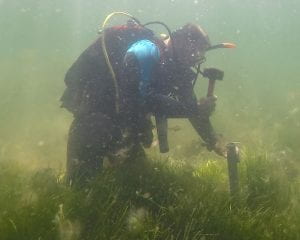Researcher provides vital input to major report on natural carbon capture
Dr Ray Ward’s work on how aquatic plants extract carbon from the environment provides a key strand of a new Natural England report into carbon sequestration.
30 April 2021
The large-scale report – entitled Carbon Storage and Sequestration by semi-natural habitats – draws on research carried out by Dr Ward and recent Brighton PhD graduate Dr Mariana Lima that explores carbon sequestration and storage in watery habitats such as seagrass meadows, kelp forests, salt marshes and mangroves. As well as studying seagrass and kelp along the south coast, Dr Ward’s work has taken him to diverse global locations including Thailand, Estonia, Arctic Norway and Brazil.
Dr Ward, Principal Lecturer in Environmental Sciences, said: “There is an increasing acceptance of the urgency to reduce carbon emissions to address the threat of climate change. This must be a multi-faceted approach and one way to remove carbon from the atmosphere is through nature-based solutions including storing and sequestering carbon in vegetation and soils.
One of the recent pushes in research has been investigating carbon in coastal systems, termed ‘blue carbon’. Blue carbon systems sequester carbon at much greater rates than terrestrial systems, including tropical forests, yet these are some of the most threatened ecosystems.
Over the last decade we’ve been investigating how carbon sequestration is impacted by climate change, pollution and ecosystem degradation in salt marshes, seagrasses, mangroves and kelp from the Arctic to the tropics and here in the UK to identify how we can best protect these vital and threatened systems.”
Dr Ward is also on the scientific advisory panel for the Help Our Kelp campaign coordinated by Sussex Wildlife Trust, which earlier this year teamed up with the Inshore Fisheries and Conservation Agency (IFCA) for a legal victory that will create a crucial marine protection area along the Sussex coast. Dr Ward has chronicled the comeback of kelp along the Sussex coast over the past five years in a recent video.

